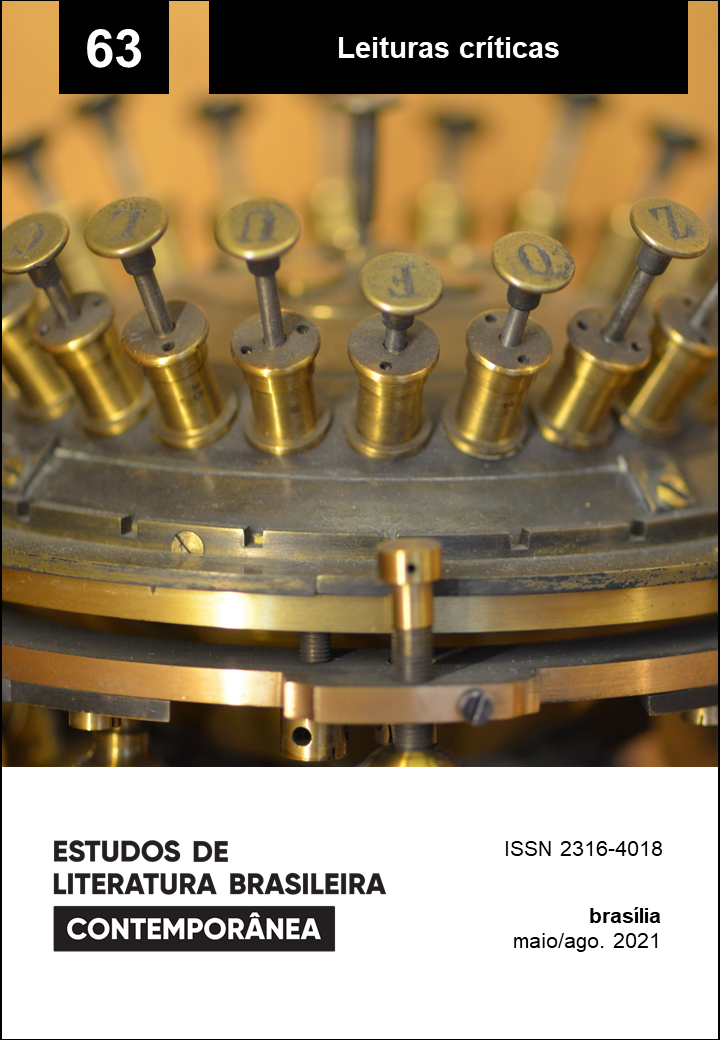Against all fires, fire: revenge as resistance in Antonio Callado
DOI:
https://doi.org/10.1590/2316-4018631Keywords:
revenge, indigenous people, peasants, military regimeAbstract
This essay analyzes the report O esqueleto na lagoa verde (1953), and the novels Quarup (1967) and A expedição Montaigne (1982), by Antonio Callado, based on the theme of revenge as a possibility of resistance and construction of a future against the authoritarianism of the military regime and the colonial process. The indigenous peoples characters and the peasants represent the dispute for land allied to a discursive and knowledge dispute, therefore the incendiary gestures of revolt are understood as ways of questioning who has the right to violence in Brazil and who is interested in the discourse of peace.
References
ARRIGUCCI JR., Davi (2010). O sumiço de Fawcett [posfácio]. In: CALLADO, Antonio. O esqueleto na lagoa verde: ensaio sobre a vida e o sumiço do coronel Fawcett. São Paulo: Companhia das Letras.
ASCENSO, Gabriel (2020). 119 A paz. Pandemia crítica. Disponível em https://www.n-1edicoes.org/textos/114 Acesso em: 15 set. 2021.
BASTOS, Alcmeno (2000). A história foi assim: o romance político brasileiro dos anos 70/80. Rio de Janeiro: Caetés.
BENJAMIN, Walter (1994). Magia e técnica, arte e política: ensaios sobre literatura e história da cultura. São Paulo: Brasiliense.
CALLADO, Antonio (1953/2010). O esqueleto na lagoa verde: ensaio sobre a vida e o sumiço do coronel Fawcett. São Paulo: Companhia das Letras.
CALLADO, Antonio (1965/1979). Tempos de Arraes: a revolução sem violência. Rio de Janeiro: Paz e Terra, 1979.
CALLADO, Antonio (1967/2014). Quarup. Rio de Janeiro: José Olympio.
CALLADO, Antonio (1972/2014). Bar Don Juan. Rio de Janeiro: José Olympio.
CALLADO, Antonio (1976/2014). Reflexos do Baile. Rio de Janeiro: José Olympio.
CALLADO, Antonio (1981/2014). Sempreviva. Rio de Janeiro: José Olympio.
CALLADO, Antonio (1982/2014). A Expedição Montaigne. Rio de Janeiro: José Olympio.
CASTRO, Eduardo Viveiros; CUNHA, Manoela Carneiro (1985). Vingança e temporalidade: os Tupinambás. Anuário Antropológico, v. 10, n. 1, p. 191-208. Disponível em https://periodicos.unb.br/index.php/anuarioantropologico/article/view/6354 Acesso em: 20 set. 2021.
CLASTRES, Pierre (2004). Arqueologia da violência: pesquisas de antropologia política. São Paulo: Cosac & Naify.
CHIAPPINI, Ligia. “Callado e a vocação empenhada do romance brasileiro”. In: CALLADO, Antonio. A expedição Montaigne. Rio de Janeiro: José Olympio, 2014.
DERRIDA, Jacques (2005) O perdão, a verdade, a reconciliação: qual gênero? In: NASCIMENTO, Evandro. Jacques Derrida: pensar a desconstrução. São Paulo: Estação Liberdade.
DIDI-HUBERMAN, Georges (2012). Quando as imagens tocam o real. Pós: Revista do Programa de Pós-Graduação em Artes da EBA/UFMG, Belo Horizonte, v. 2, n. 4, p. 206-219.
DINIZ, Clarissa (2020). Street fight, vingança e guerra: artistas indígenas para além do “produzir ou morrer”. Espaço Ameríndio, Porto Alegre, v. 14, n. 1, p. 68-88. Disponível em: https://www.seer.ufrgs.br/EspacoAmerindio/article/view/102736/58302 Acesso em: 20 set. 2021.
ESBELL, Jaider (2021). Universos que se espelham nas artes. Teatro e os povos indígenas. Disponível em: https://www.n-1edicoes.org/universos-que-se-espelham-nas-artes? Acesso em: 30 set. 2021.
FIOROTTI, Devair Antonio (2020). Os macuxis riem com o jabuti ou da traquinagem ao questionamento pelo riso. Revista Brasileira de Literatura Comparada, v. 22, n. 39. Disponível em: https://www.scielo.br/j/rblc/a/FWjn5638h9xZmH8X55NknkC/?lang=pt Acesso em: 30 set. 2021.
GERMANO, Idilva (2005). Florestas, índios e sabiás: itinerários dos símbolos românticos da nacionalidade na ficção de Antonio Callado. Revista de Letras, Fortaleza, v. 1-2, n. 27, p. 17-26. Disponível em: http://repositorio.ufc.br/bitstream/riufc/17422/1/2005_art_impgermano.pdf Acesso em: 20 set. 2021.
GROSSMAN, Jonathan (2000). Violência e silêncio: reescrevendo o futuro. História oral, Revista da Associação Brasileira de História Oral, v. 3, p. 7-24.
GUERRAS DO BRASIL. DOC. Direção: Luiz Bolognesi. Produção de Laís Bodanzky e Buriti Filmes. Brasil: Netflix, 2019.
KIENING, Christian (2014). O sujeito selvagem: pequena poética do Novo Mundo. São Paulo: Editora da Universidade de São Paulo.
KOPENAWA, Davi; ALBERT, Bruce (2015). A queda do céu: palavras de um xamã yanomami. São Paulo: Companhia das Letras.
MOMBAÇA, Jota (2016). Rumo a uma redistribuição desobediente de gênero e anticolonial da violência. Oficina de Imaginação Política e 32ª Bienal de São Paulo. Disponível em: https://issuu.com/amilcarpacker/docs/rumo_a_uma_redistribuic__a__o_da_vi Acesso em: 20 set. 2021.
ROSA, Guimarães (1956/2001). Grande sertão: veredas. Rio de Janeiro: Nova Fronteira.
ROTHER, Larry (2019). Rondon, uma biografia. Rio de Janeiro: Objetiva.
SCOTT, James (2013). A dominação e a arte da resistência: discursos ocultos. Lisboa: Letra livre.
STENGERS, Isabelle (2011). Cosmopolitics. University of Minnesota Press.
STENGERS, Isabelle (2018). A proposição cosmopolítica. Revista do Instituto de Estudos Brasileiros, São Paulo, n. 69, p. 442-464. Disponível em: https://www.revistas.usp.br/rieb/article/view/145663 Acesso em: 20 set. 2021.
SÜSSEKIND, Flora (1990). O Brasil não é longe daqui: o narrador, a viagem. São Paulo: Companhia das Letras.
TAYLOR, Diana (2013). O arquivo e o repertório: performance e memória cultural nas Américas. Belo Horizonte: Editora UFMG.
Downloads
Published
Issue
Section
License
Copyright (c) 2021 José Humberto Torres

This work is licensed under a Creative Commons Attribution-NoDerivatives 4.0 International License.
Authors who publish in this journal agree to the following terms:
a) The authors maintain the copyright and grant the journal the right of first publication, the work being simultaneously licensed under the Creative Commons Attribution License-Non Commercial 4.0 which allows the sharing of the work with acknowledgment of the authorship of the work and publication this journal.
b) Authors are authorized to enter into additional contracts separately, for non-exclusive distribution of the version of the work published in this journal (eg publish in institutional repository or as a book chapter), with authorship recognition and publication in this journal.
c) Authors are allowed and encouraged to publish and distribute their work online (eg in institutional repositories or on their personal page) after the editorial process, as this can generate productive changes, as well as increase the impact and citation of published work (See The Effect of Free Access).
d) The authors of the approved works authorize the magazine to, after publication, transfer its content for reproduction in content crawlers, virtual libraries and the like.
e) The authors assume that the texts submitted to the publication are of their original creation, being fully responsible for their content in the event of possible opposition by third parties.


